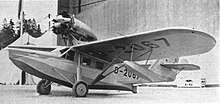Heinkel He 57
Appearance
| Heinkel He 57 Heron | |
|---|---|

| |
| Front view of Heinkel He 57 at Stockholm International Aero Show 1931 | |
| Role | Amphibious flying boat |
| National origin | Germany |
| Manufacturer | Heinkel |
| Designer | Dr Ernst Heinkel |
| First flight | 1929-30 |
| Introduction | 1930 Paris Aero Show |
| Number built | 1 |
The Heinkel He 57 was a single engine amphibious flying boat built in 1929.
Development
[edit]The sole He 57 (factory designation HE.57) was built by the Ernst-Heinkel-Flugzeugwerken at Warnemunde in 1929.[1] It was displayed at the Paris Aero Show in December 1930 and at the Stockholm International Aero Show in May 1931.[2] It was purchased by the flying school at List auf Sylt who used it as a trainer.[1]
Design
[edit]The double stepped hull was made of aluminum. The wings used wood spars and aluminum ribs with fabric covering. The landing gear was hydraulically raised with a manual pump.[2]
Specifications Heinkel He 57
[edit]
Data from Flight [2] unless noted
General characteristics
- Capacity: 6
- Length: 11.8 m (38 ft 9 in) [1]
- Wingspan: 16.00 m (52 ft 6 in)
- Wing area: 39.2 m2 (422 sq ft)
- Gross weight: 2,440 kg (5,380 lb)
- Powerplant: 1 × Pratt and Whitney Wasp Radial, 340 kW (450 hp)
- Propellers: 2-bladed
Performance
- Maximum speed: 195 km/h (121 mph, 105 kn)
- Service ceiling: 3,800 m (12,500 ft) [1]
- Time to altitude: 5 min to 1,000 m (3,300 ft)
- Wing loading: 62.3 kg/m2 (12.75 lb/sq ft)
- Landing speed: 93 km/h (58 mph; 50 kn)
References
[edit]Wikimedia Commons has media related to Heinkel HE 57.
